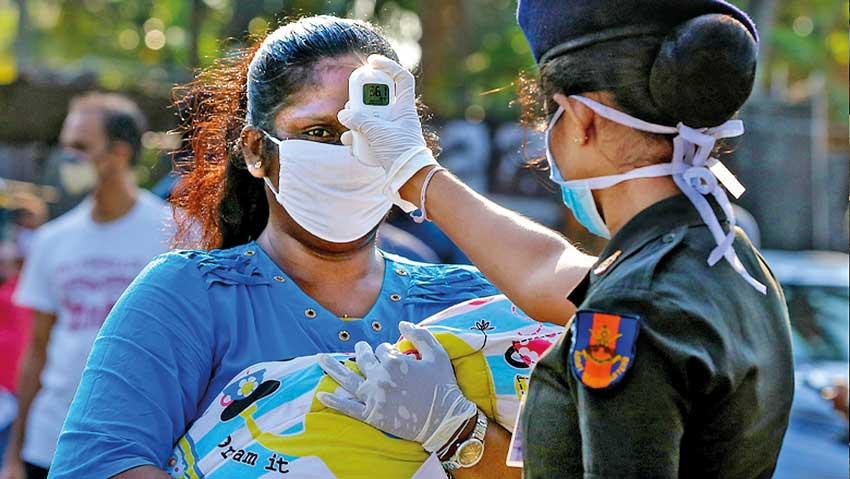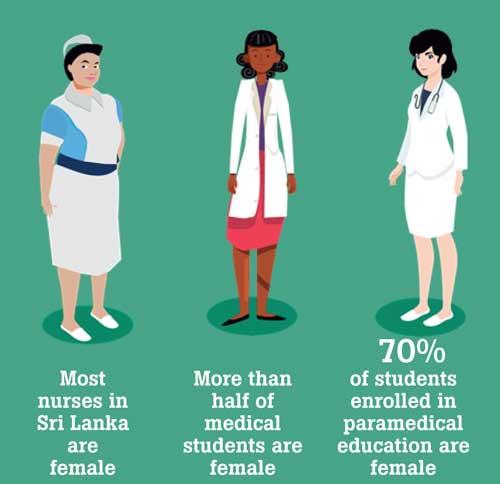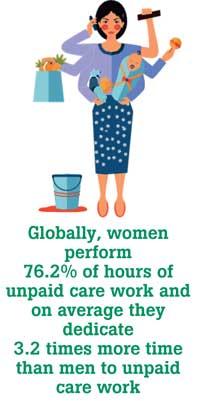Reply To:
Name - Reply Comment
Last Updated : 2024-04-17 00:06:00

The current global outbreak of COVID-19 that has already disrupted the lives of the people would further entrench the existing gender inequalities in many ways. In most contexts, women and girls are disproportionately impacted due to their relatively disadvantaged situation, distinct social obligations and responsibilities.
While early reports suggest that men are more likely to succumb to COVID-19, eventually girls and women pay the social and economic toll disproportionately. Understanding the gender issues in a crisis is important for many reasons: differences in responses by women and men, changes in gender roles across age categories over time, changes in power dynamics and differences in concerns, perspectives, experiences and solutions to the issues, as well as differing perceptions and concerns regarding culturally acceptable practices.
COVID-19 pandemic and working women
The gendered impact of the COVID-19 pandemic on employment or labour markets mainly depends on sex segregation in sectors and occupations. On the one hand, social distancing, lockdowns, mobility restrictions and other control measures associated with the COVID-19 crisis have naturally hit service sectors, where frequent interactions occur between consumers and providers, in which women tend to be overrepresented.

On the other hand, control measures have had a great impact on occupations, where it is more difficult to adopt telecommuting. ‘Tourism’, ‘apparel and textile’, ‘construction and engineering’, ‘retail and consumer’ and ‘banking and finance’ have been identified as the most vulnerable sectors in Sri Lanka, due to the pandemic. Apart from the ‘construction and engineering’ sector, in other sectors a considerable share of employed persons are females.
Another important factor for differential impacts on women and men is that the increased demand for unpaid care work during a health crisis. Past experiences with disease outbreak indicate that the burden of unpaid care work by women and girls get exacerbated. When healthcare systems are strained by efforts to contain outbreaks, care responsibilities are inevitably passed onto women and girls. Besides, due to closure of schools and day-care centres, child care needs have massively increased. A Time Use Survey carried out in Sri Lanka has identified that women’s participation in unpaid care work is more than that of men’s.

During the time of a pandemic with lockdowns and other mobility restrictions, inevitably women are more burdened with unpaid care work. These additional care responsibilities would constrain women’s participation in economic activities or even force them for complete withdrawal from the current economic activities. As such, this would have a huge impact on working mothers.
The overrepresentation of women in vulnerable forms of work heightens their vulnerability to poverty in times of a crisis. As a result of the slowdown in economic activities, the decrease in income and livelihoods combined with the absence of adequate safety nets may force households to engage in negative coping mechanisms.
According to 2018 statistics, while 51.3 percent of the employed females in Sri Lanka are employed in the informal sector, 61.8 percent of the employed females are doing informal jobs. Both segments who are working in the informal sector and doing informal jobs are vulnerable to economic crises.
Opportunities to improve female labour force participation
Despite the negative impact of the COVID-19 pandemic on working women, it may also create some counteracting forces that may have the potential to reduce gender inequality in the labour market in the long term. More flexible work arrangements (such as work from home – (WFH), flexible working hours and telecommuting) and changes in social norms and role models are two such important positive changes that would promote gender equality.
However, there are certain challenges for Sri Lanka in making use of these opportunities. First, there are practical difficulties remain in adopting WFH for the major job categories, that contribute to the total female employment. Further, the country is also challenged by the information and communication technology (ICT) facilities. ICT plays an important role in promoting WFH.
Another aspect of WFH is balancing the home and job-related requirements. It is important to make sure that WFH would not place additional pressure or burden on working women as there may be issues in allocating time for office work, care responsibilities and household chores in a home environment.
Policy implications
Extending social protection to women in the informal economy is critical as preventive measures of the pandemic are placing a disproportionate toll on them. Ensuring the rights and safety of informal workers and supporting informal workers organisations are also important measures in safeguarding women, those who are employed in the informal sector.
Sectors that have more prospects of adopting flexible work arrangements should be encouraged to practice them in the long run. Individual companies have to test and identify the approaches that work best for them to facilitate remote working and encourage female employees to reap the maximum benefits of these approaches.
Sri Lanka’s current readiness in seizing the opportunities offered by ICT is not at a satisfactory level. Moreover, the country is also challenged by the gender digital divide. It limits women’s access to, use of and benefits from ICT. If the country is to adopt WFH as a means on increasing female labour force participation, issues in ICT infrastructure and prevailing gender digital divide should be considered as areas of priority. In this regard, enhancing access to and improving the affordability of digital technologies and improving ICT skills of females, those who are already employed, are important policy measures. These can be invested upon to upgrade the ICT infrastructure of the country and thereby, to narrow the gender digital divide.
It is also important to ensure that flexible working arrangements would not place additional pressure on working women. Conflicts in time allocation would simply translate the work flexibility into greater stress. Availability of reliable childcare is important in this regard especially when having very young children as it would help the working mothers in balancing their official obligations and care obligations.
Providing more efficient intervention of the government is needed, by regulating and monitoring existing day care centres and crèches. Encouraging the private sector to invest more on day care centres and crèches is also vital.
(This Policy Insight is based on the comprehensive chapter on ‘Pandemics, Women and Women in the Workforce’ in the ‘Sri Lanka: State of the Economy 2020’ report, the flagship publication of the Institute for Policy Studies of Sri Lanka (IPS))

Add comment
Comments will be edited (grammar, spelling and slang) and authorized at the discretion of Daily Mirror online. The website also has the right not to publish selected comments.
Reply To:
Name - Reply Comment
On March 26, a couple arriving from Thailand was arrested with 88 live animal
According to villagers from Naula-Moragolla out of 105 families 80 can afford
Is the situation in Sri Lanka so grim that locals harbour hope that they coul
A recent post on social media revealed that three purple-faced langurs near t

10 Apr 2024
09 Apr 2024